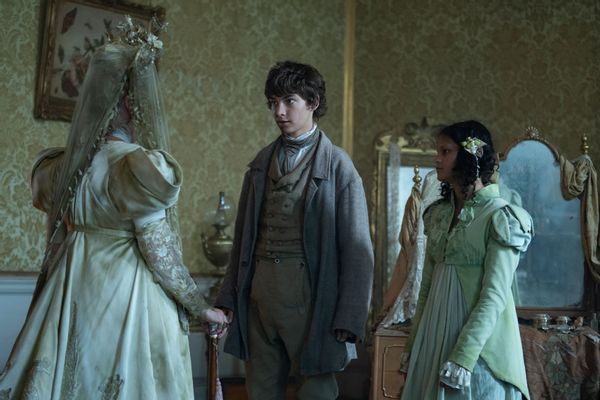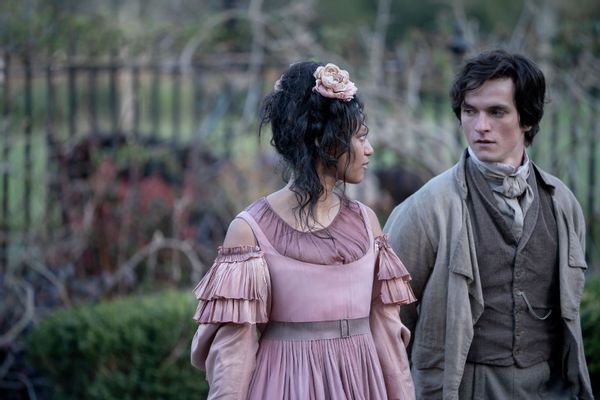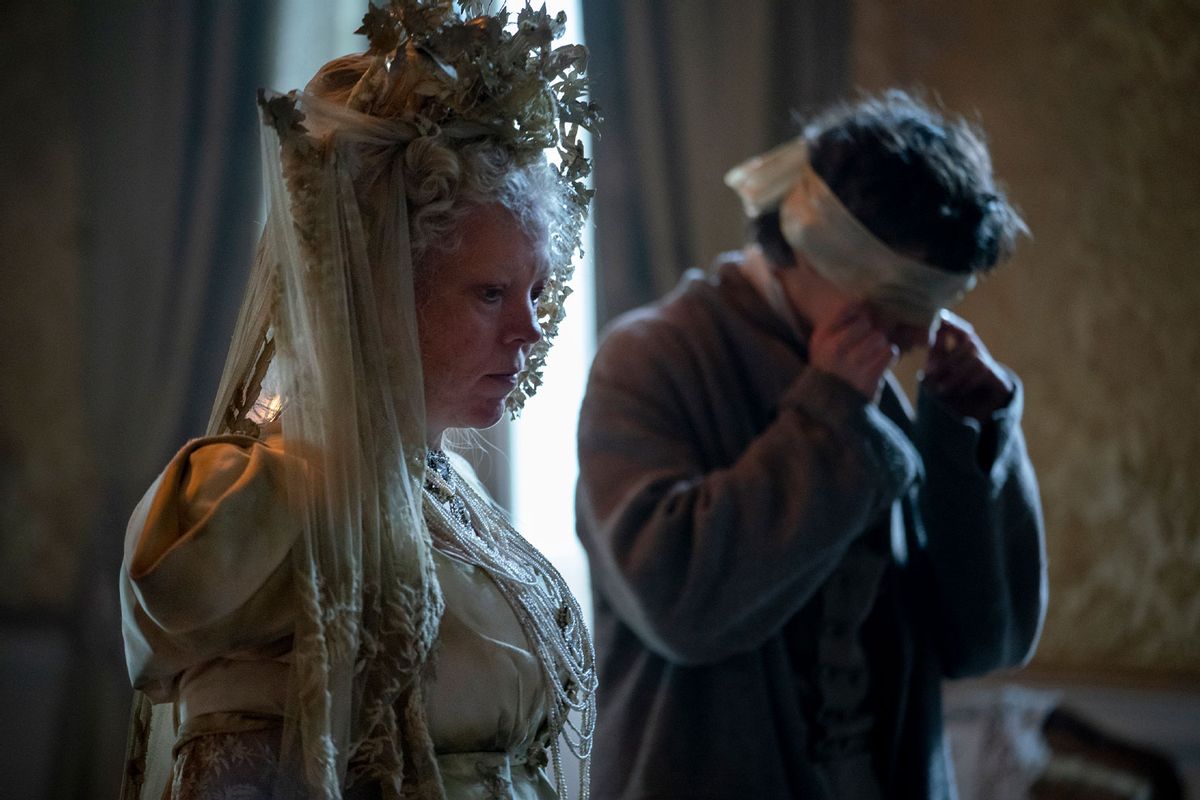Charles Dickens' "Great Expectations" boasts one of the literature's most enigmatic and forbidding figures in Miss Havisham, the jilted bride who spends the rest of her days in her wedding gown as her once illustrious home decays around her. Miss Havisham is the epitome of gothic tragedy, representing lost love, bitterness and vindictiveness, a complicated brew brought to life by an array of formidable actors including Anne Bancroft, Gillian Anderson and Helena Bonham Carter.
In FX's version, adapted by Steven Knight, Olivia Colman's performance can't help but stand apart from the others — particularly given that her Miss Havisham, though familiar, is quite different, starting with her appearance.
Traditionally, Miss Havisham is presented as a dusty figure enrobed in cobwebby lace. But Colman explained in a recent interview that costume designer Verity Hawkes wanted to portray the brokenhearted woman as rotting from the inside by darkening her hem to look like there's mold growing through it.
"I just thought, 'Oh my God, that's it,'" Colman explained. "There's such darkness inside her. And I love the idea of her just rotting." Not before she can corrupt a few children, including the novel's hero Pip (played by Tom Sweet as a child and Fionn Whitehead as an adult), the blacksmith's boy she invites into her home to be a playmate for her daughter Estella (Chloe Lea and Shalom Brune-Franklin).
Miss Havisham offers to shape Pip into a gentleman in exchange for spending time with Estella. The well-meaning adult who brokers the agreement isn't aware of her true purpose for extending her hand to a working-class boy, which is to indulge what she warns Pip upon their first meeting is her penchant for "sick fantasies," her keenest being to crush a man's heart.
She shames his grammar, then orders him to call Estella into the room. "Welcome to eternal winter," Estella hisses at him.
"Innocent, moments before the great corruption," Miss Havisham intones, smiling sadistically a few beats later as she adds, "So, a common boy and a proud pretty girl. I want to watch you play."
"I think there are many areas where Dickens just couldn't go there," says Steven Knight.
From there she ties a sash around Pip's eyes to demonstrate that, yes, love is blind, as she orders him to stumble around a room he's never been in. The goal is to find Estella, "and she's all yours." It's not designed for Pip to win. He breaks things as she regales the boy with her sad history of being abandoned on her wedding day.
To ensure the metaphor lands with the viewer, this scene is intercut with a peek at what Pip's older sister Sara Gargery (Hayley Squires) does when her husband, the town blacksmith, is off at work. Her hobby involves a riding crop, a heavy hand, and a very naked family acquaintance, Mr. Pumblechook (Matt Berry).
Knight's "Great Expectations" isn't for the prudish or for purists, which those who saw his rendition of "A Christmas Carol" probably guessed. But it is, he believes, something closer to what Dickens might have written if he had the liberty to do so in 1860, when the chapters were released weekly before they were assembled into a novel in 1861.
 Olivia Colman as "Miss Havisham," Tom Sweet as "Young Pip" and Chloe Lea as "Young Estella" in "Great Expectations" (Miya Mizuno/FX)
Olivia Colman as "Miss Havisham," Tom Sweet as "Young Pip" and Chloe Lea as "Young Estella" in "Great Expectations" (Miya Mizuno/FX)
On the page, Miss Havisham's sick game is one of cards, a few rounds of Beggar My Neighbor that isn't fair or fun. That falls short of evoking the caresses of sensuality Knight writes into the spinster's grim education of Pip as a boy and, later, as a young adult, when she arranges for Pip to lose his virginity and makes him dance with Estella, knowing that he loves her and that this is the closest she'll ever allow Pip to be to the object of his desire.
"I think that Dickens was writing at a time when there are lots of things he couldn't write about. Not because he wasn't brave, but because you just couldn't. And sensuality, sexuality, is among those things," Knight explained in a separate interview. "Throughout his books, there are sort of clues that his own audience would have got, as to what he's talking about. I think there are many areas where Dickens just couldn't go there." (For example, another title for the card game the children play is Strip Jack Naked.)
In 2023 Knight can, and therefore he does. "Great Expectations" extends his vision of what he considers to be a more honest gaze at Victorian England he captured in 2017's "Taboo." Here, the idea of filth is internal and radiates outward.
Dickens' novel is a class parable about a boy raised by a blacksmith who believes himself to be better than his humble origins and the people around him. As Pip grows up and seeks his fortune in London, he receives many lessons about the nature of the upper classes and the ways their snobbery is frequently at odds with the definition of nobility.
But the novelist is far gentler than the screenwriter, which we first see in the way Miss Havisham is rendered in the script and through Colman's interpretation.
Colman says she'd never read Dickens' book, which she found quite helpful. "As I read the script, I knew some bits were different, but I didn't know which bits very clearly. But that was great because I could just commit to the script I've been given, which is really my job."
Want a daily wrap-up of all the news and commentary Salon has to offer? Subscribe to our morning newsletter, Crash Course.
Knight explained that the self-awareness Colman brought to the role was essential. "With Miss Havisham, it's quite interesting to have that at least as 5% of the character: ' I know what I'm doing. I know what this is.' It's not derangement, it's not insanity."
"It's a miracle that you still sort of feel empathy for her," Olivia Colman says about Miss Havisham.
"What I wanted was more of Miss Havisham, frozen in time, but still unchanged," he continued "And the potential is that it can change, it's not all finished in her."
Colman agrees. "I love the fact that this is more physical, more sensual, and sort of more visceral form of the character. It's a miracle that you still sort of feel empathy for her, really."
Knight was drawn to "Great Expectations" because of the similarities he saw between his life and that of the main character. "Pip is blacksmith's son, and so am I," he said. "I was expected to become a farrier and didn't. So there was an expectation on me that is sort of similar to the expectation in the journey of class. I think it's incredibly it's a very English thing."
 Shalom Brune-Franklin as "Estella" and Fionn Whitehead as "Pip" in "Great Expectations" (Miya Mizuno/FX)
Shalom Brune-Franklin as "Estella" and Fionn Whitehead as "Pip" in "Great Expectations" (Miya Mizuno/FX)
Some readers might make a similar statement regarding the sanctity of Dickens, particularly when taking in the extremity of the alterations Knight makes to Pip's narrative arc. Knight responds to that notion by explaining the liberty he views in taking an established world and filtering it through his signature lens.
"As far as I'm concerned, the book exists as an object. It always will be there. And it'll be there long after I'm gone. [. . . ]If you're invited to do a version of it, then as far as I'm concerned, [the purpose] is to take the fundamentals of what it is and then see what happens when you just start writing."
He added, "The best way I could describe it is, is imagine reading a book during the day and then dreaming about it at night. And the adaptation is the dream."
The first two episodes of "Great Expectations" are streaming on Hulu. Future episodes debut Sundays.
Read more
about literary adaptations

Shares